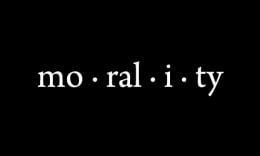Is morality undervalued? Are ethics replacing morality?
- savvydatingposted 9 years ago
0
Is morality undervalued? Are ethics replacing morality?
Though similar, there are distinctions between morality and ethics. Which school of thought do you live by? Are you moral or ethical?
I think this is a very interesting question. My first response is that a moral person must have ethics on which to guide their life of morality.
I would never consider an immoral man one with ethics. Sure I suppose you could say he just has bad ethics. We say that with work all the time; "he has a bad work ethic".
Somethings are just in the mind. I confess to coveting things from time to time. In my ethical construct that is immoral. I do not act on it so I suppose I am still ethical but just the thought makes me immoral.
How about if I do not have ethics regarding certain things but I engage that part of my life morally correct, just by chance. So am I moral just for acting right without ethics?
So I do not think we can be moral without a set of ethics. A fun question is: "are the Ten Commandments a code of ethics or rules of morality?" I do not commit adultery - does that make me ethical or a moral man?
So my straight forward answer to the question is to be one you must be both.Then do you not agree that a person strictly following ethical principles may not have any morals at all, since ethics are dependent on the definitions of others?
Try to specify something moral. In order to do so you must use language. Language is a social concept. Morals are also partially determined by social interactions with others. As are ethics. There is no black and white in this area.
We need to focus on morality, not legalistic ethics.
Ethics has evolved into complex reasoning PLUS "it is unique per person".
This creates the danger that what is right for me is wrong for you, and that if someone has enough excuses, they can commit immoral acts like murder and rape and theft.
After all, if there is no underlying universal morality, there are only the ethics they ascribe to and they can justify killing me and taking my stuff because their ethics allow for it.But morality can do the same thing. Universally accepted that in war we kill each other. "They" can justify killing you based on morals.
I agree with Tamara, Eric. Morality would not allow for cruelties, but ethics can.
Is it moral for a young Marine to kill a father of 4 in a gun battle to re-take land in war? Perhaps you would say yes if it was a moral and justified war. Perhaps you would say no if you thought the war was immoral. Where are the ethics?
Is it not better for a few to die than thousands, or for millions to lose their homes and become displaced? Sometimes morality means looking at the larger picture---beyond one's "ethics."
- Peter Hillsonposted 9 years ago
0
Morality is a tricky subject, as it tends to vary from person to person and culture to culture. It's hard for us to define a universal set of morals that everybody agrees on. Any set of universal morals tends to be extremely broad and not very helpful beyond assuring us that "yes, murder is bad". Very specific and controversial situations are where morals tend to get fuzzy.
This is also where ethics become useful. Most ethical theories either outline a set of criteria to determine the ethicality of a situation, or at the very least prescribe a set of values that should be adhered to. Ethical theories are useful in that they give us an easier way to approach extremely complicated topics.
However, there can even be conflicts between different ethical theories. Different process lead to different conclusions or a process reaches the right conclusion, but "for the wrong reasons". In these cases it is up to the decision maker to analyze the situation, apply various theories, and determine which theory, (or which combination of theories), will yield the most sensible solution.
Thus, while ethics are an excellent tool for breaking down complicated issues, they cannot act independently from human morality. They bring us most of the way towards making a decision, but in the end the final choice is often left up for debate. This debate can be logical, and reasoned with fact-based evidence, but morality will always subconsciously underly any method of thought. Ethics are vital to proper moral decision making, functioning to logically organize our morality, but I do not believe that decisions can be made using ethical theory alone. - jonnycomelatelyposted 9 years ago
0
In some countries it's accepted that a man wishing to relieve himself will do so in the street without worrying about other people. It's culturally accepted that others will not look, and it's a natural need.
In other countries, you can be arrested for doing so.
Is this a matter of morality or ethics?
I suggest it all depends on perceptions of what is "right," what is "wrong." Trying to change the perceptions of another person is very, very difficult if not impossible.Not sure where you're going with the urination analogy. I will say that we need not re-define our current definitions of morality and ethics. It appears that some are confused about what the actual definitions are.
I was just trying to show that "morals" might be seen as variable, depending upon where we are in the world, and what local culture dictates.
Have you a clear distinction between morals and ethics?I see. Ethics are variable as they are dictated from the "outside". Morality is a constant, as it ascribes to a person's character. But yes, ethics and morals do share similarities.
Savvy, I find it hard to come up with a distinction here, other than morality seems to be associated more with religious values, and ethics in general society's values. One of the schools my children were attending (and others I know of) dropped "religious instruction" from its curriculum and added "ethics" classes instead. I think there is a fine line between morals and ethics. My way of thinking is that morals are values you are born with or instilled early by your parents. Ethics are learnt and aquired through experience and your participation in society.
There is a fine line, Jodah. It is said that morals define personal character, and is unchanging, while ethics depend upon what a group or society chooses, so it is "other-dependent." You always keep the conversation at a higher level. Thank you.
Seems like what a lot of people call morality is really just obedience, and to me, obedience is immoral, so I don't know what school of thought that puts me in.
I suppose that I would say I am ethical, which means that I actually choose what is moral rather than accept what others say it is.
And considering how many 'moral' people do really terrible things, I'd say that morality is a bit overvalued.Well said. I really want someone to set forth a plan or concept as to which is morality and which is ethics. It is so blurry it is not even a line.
Junk seller....You read the question and you answered it according to your conscience and beliefs. While I disagree with your view of what morality is, I appreciate your answer. Thank you.
I think morality is over-valued as an idea and under-practiced as a way of life. Just about everyone thinks they are moral, even the ones committing unethical, criminal, even immoral acts.
People use ethics like a dirty word these days. There is nothing wrong with ethicality- or holding ourselves to higher standards than simple morality applies. Jesus was ethical but also moral. For ethics to have value, there must be a moral basis to act as a foundation and limiting structure. What is the end product of the ethics of amorality beyond some Kafkaesque sprawling bureaucratic dystopia?
This isn't a question of religion because people of any religion or none at all can choose to be both moral and ethical while they also can choose to be both immoral and unethical as well. Great question!Thank you, Bersarian. My understanding is that morality pertains to one's character, and as such, is consistent. I do agree that many who believe they are moral are actually quite immoral.
How can you know whether Jesus was ethical or moral? You were not there to witness his life. You, I, anyone, can only be sound judge of our own personal life. No one knows my life, my desires or intentions like I do.
- ValKarasposted 9 years ago
0
If morality can be defined as the Golden Rule of - "Don't do to others what you don't want others do to you" - then YES, morality certainly is undervalued.
It's easy though to be lost in the maze of theorizing over morality and ethics as abstract concepts while keeping the tricky nature of humans out of it. People may be praised for many things, but one of them is NOT consistency of character.
We all like advertising our "values", our "principles", which we royally break from time to time, under the evergreen umbrella of "we are only imperfect humans".
However, there are rules of conduct and I would say - without any sarcasm - our sense of morality is generated by fear of punishment by either an outer authority or our conscience, which was socially programmed in our early formative years.
The ethical paradigm of our times is just slightly more sophisticated than the one of many epochs before - but is equally materialistically oriented, hence animalistic in its core, promoting territoriality, hoarding of the means of survival, domination, and arrogance. (You may add more to this list). So greed is not immoral but considered a virtue - AFTER we label it as "success", "healthy ambition", or alike.
"Glory" of a country is basically something that grew out of soil moistened by some peoples' blood, sweat, and tears, with its riches generated by stealing, grabbing, and exploitation.
Then, there is a discount on human life as well, and political or religious leaders are the ones that give us some very "dignified justifications" for it. On one hand, thousands of dollars are spent on saving a life, and millions are spent for medical research - and then a cheap bullet is made to make a laughing matter of all that effort.
I hope that all this is supporting my direct answer to your question Savvy - yes, morality is still a virtue to become an aim of consciousness evolution, but not something that humanity so far could include among its big achievements after its parting from animal kingdom. Take this "parting from animal kingdom" as a figure of speech not as my belief in evolution. For sake of some humor, man is just as good at imitating an ape, as the ape is good at imitating him.
Our world is the proof of it.Val,.the golden rule is "of doing" rather than "not doing." Personally, when I choose morality, fear of punishment does not enter my head. Morality is "higher" and not subject to fear at all. Humans have the capacity to choose above the animalistic.
Savvy - There was no need to correct the Golden Rule, it works the same my way. From this need to correct it I see where this is going, so, if you don't mind I am retiring to my world of peace, calm, and a cultivated harmony. I am done here.
How sweet to comment and then retire. I wish I did not care. Not caring would be so blissful until the Nazis come. But some from their place choose to agitate and then retreat. How nice that would be.
Morality is equal to opinions. Like each one of us has a different opinion, ethics vary and cannot be weighed as a whole for the majority. When one person says it is immoral to eat meat and only themselves eats plants, another could say that it is immoral to eat plants. It is merely pointing out a behaviour that isn't conforming to accepted standards of morality. In a case of food ethics, the question is the environment and the best option for nutrition in cases of food, which also depends on your knowledge of nutrition- not moral opinions. The most important question is the source of where morals are learned and not to confuse them with ignorance that is created by a consistant opinional basis of perception that is passed down to us.
Plants and meat aside, if one is indoctrinated by a jihadist doctrine, then one has accepted a cultural norm, within a distinct set, that is harmful. However, morality transcends cultural norms. In ethics, there is a gray area that is not absolute.
Related Discussions
- 135
How do you convince someone that they are not destined to be LGBT?
by taburkett 9 years ago
How do you convince someone that they are not destined to be LGBT?As a young executive, I counseled individuals in the past and promoted them into moral society by consistently stating the truth about the mental affliction. Emotional outbursts continue to support the education of LGBT as a...
- 34
What holds more weight, Morality or legality?
by Kenneth J Moore Jr. 13 years ago
What holds more weight, Morality or legality?I'll use a two people example first: Penn State which legally fulfilled their obligation but morally let kids get molested. Second: Mitt Romney legally becoming wealthy while morally didn't invest in America. This can be said for marriage, Religion,...
- 12
Can morality exist without a divine authority?
by fred allen 14 years ago
Can morality exist without a divine authority?Without absolutes who has the authority to establish moral boundaries? If there is no divine standard, can there be such a thing as morality or right and wrong?
- 28
Does or Can Morality Exist?
by SpanStar 13 years ago
Having declared ourselves as free thinking righteous believers (meaning we understand the concept of a right and wrong).* Would curtailing shock jock radio announcer's verbal expressions over the airway be immoral?* There are those who say the death penalty is immoral, is it?* Some say not allowing...
- 31
Is man capable of morals?
by Captain Redbeard 14 years ago
Richard Dawkins poses the theory that studying the bible for its literature content is a great thing. However we should not follow its teachings. He feels that ones moral standards should not come from this book or any book for that matter but from someplace deep inside of man instead of outside of...
- 91
Like it or not, God is immoral.
by Greatest I am 13 years ago
Like it or not, God is immoral.This clip shows how man has defined morality. I generally agree with it as it closely resembles the morality shown in all the holy books. I see them as closely resembling the golden rule.http://blog.ted.com/2008/09/17/the_real_differ/This clip show how what I see as a...












